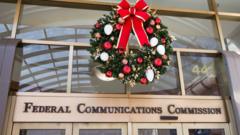The ruling marks a significant turning point in the ongoing debate over internet regulation and consumer protections.
Court Ruling Nullifies Net Neutrality Regulations in the U.S.

Court Ruling Nullifies Net Neutrality Regulations in the U.S.
A federal court's recent decision undermines the Biden administration's efforts to reinstate net neutrality rules.
A recent decision by a U.S. court has delivered a blow to the Biden administration’s attempts to reinstate "net neutrality" regulations, determining that the federal government lacks the authority to regulate internet service providers (ISPs) as if they were public utilities. Advocates for an open internet, who have made it their mission to push for equal treatment of all legal content by providers like AT&T, view this ruling as a major setback.
The original net neutrality rules originated from the Federal Communications Commission (FCC) during Barack Obama's presidency but were revoked during Donald Trump's administration in 2017. As Trump prepares for a potential return to the White House, this ruling appears to signal the conclusion of a protracted legal struggle surrounding the issue.
In their judgment, the judges pointed out the inconsistent approach taken by different administrations regarding internet regulations. They emphasized the court’s decision to move away from granting deference to the FCC's interpretation of the law, referencing a recent Supreme Court ruling that restricts federal agencies' regulatory powers. "Applying Loper Bright, means we can end the FCC's vacillations," said the Sixth Circuit Court of Appeals.
Brendan Carr, a Republican member of the FCC appointed by Trump, expressed satisfaction with the court's decision to invalidate what he described as the Biden administration's "Internet power grab.” Meanwhile, Jessica Rosenworcel, the FCC's outgoing Democratic commissioner, articulated disappointment, underscoring that the ruling now places the onus on Congress to advocate for net neutrality and to uphold open internet principles through federal legislation. “Consumers across the country have told us again and again that they want an internet that is fast, open, and fair,” she noted.
Net neutrality has previously catalyzed passionate advocacy and public campaigns, notably featuring comedian John Oliver, whose appeal for public support flooded government communication channels. However, the issue has waned in urgency since the rollback of regulations in 2018.
This latest ruling has no bearing on state-level net neutrality laws, which may offer similar protections in various jurisdictions. Nonetheless, advocates like John Oliver have reiterated that comprehensive national regulations are crucial for curtailing the influence of broadband providers, who could potentially limit access or charge additional fees for higher service quality.
Public Knowledge, a progressive internet policy organization, condemned the court's ruling, claiming it diminishes the FCC’s authority to implement privacy protections and safety measures. They argue the court’s classification of ISPs as merely "information services" rather than telecommunications companies creates a precarious regulatory void, leaving consumers at risk while granting ISPs unchecked power over internet access.
Conversely, USTelecom, an industry group representing major ISPs including AT&T and Verizon, hailed the ruling as a "victory for American consumers," suggesting that it will lead to an influx of investment, innovation, and competition within the evolving digital marketplace.





















